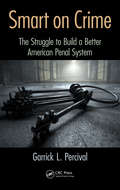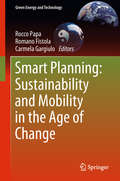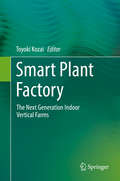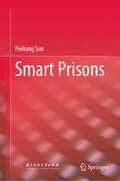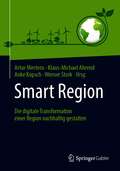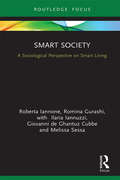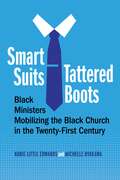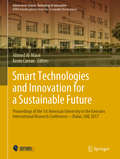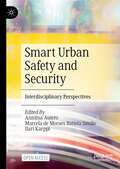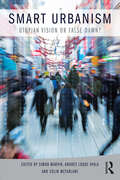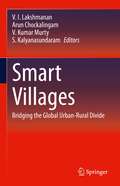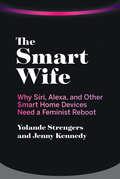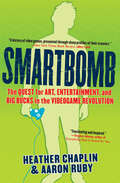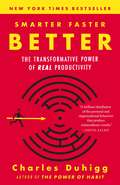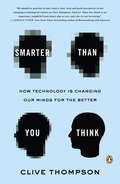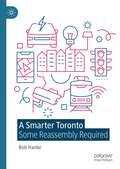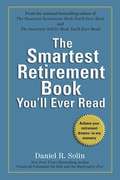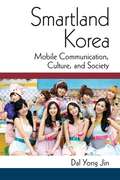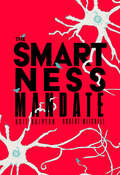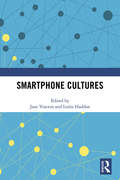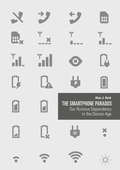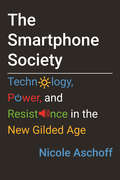- Table View
- List View
Smart on Crime: The Struggle to Build a Better American Penal System
by Garrick L. PercivalThe most punitive era in American history reached its apex in the 1990s, but the trend has reversed in recent years. Smart on Crime: The Struggle to Build a Better American Penal System examines the factors causing this dramatic turnaround. It relates and echoes the increasing need and desire on the part of actors in the American government system to construct a penal system that is more rational and humane.Author Garrick L. Percival points out that the prison boom did not naturally emerge as a governmental response to increasing crime rates. Instead, political forces actively built and shaped the growth of a more aggressive and populated penal system. He is optimistic that the shifting political forces surrounding crime and punishment can now reform the system, explaining how current political actors can craft more constructive and just policies and programs. The book shows how rationality and humanitarianism lead to a penal system that imprisons fewer people, does less harm to the lives of individual offenders and those close to them, and is less expensive to maintain.The book presents empirical data to concretely demonstrate what is working and what is not in today’s penal system. It closely examines policies and practices in Texas, Ohio, and California as comparative illustrations on what progress has been made or needs to be made in penal systems across the United States. The book includes a comprehensive discussion of highlighted issues, and relates more than two dozen interviews with pivotal political actors who clarify why there is a major shift underway in the American penal system. Their insights reveal paths that can be taken to improve the current penal system.
Smart Planning: Sustainability and Mobility in the Age of Change (Green Energy and Technology)
by Rocco Papa Romano Fistola Carmela GargiuloThis book offers an overview of sustainability and urban mobility in the context of urban planning – topics that are of considerable interest in the development of smart cities. Environmental sustainability is universally recognized as a fundamental condition for any urban policy or urban management activity, while mobility is essential for the survival of complex urban systems. The new opportunities offered by innovations in the mobility of people, goods and information, as well as radically changing interactions and activities are transforming cities. Including contributions by urban planning scholars, the book provides an up-to-date picture of the latest studies and innovative policies and practices in Italy, of particular interest due to its spatial, functional and social peculiarities. Sustainability and mobility must form the basis of “smart planning” – a new dimension of urban planning linked to two main innovations: procedural innovation in the management of territorial transformations and the technological innovation of the generation, processing and distribution of data (big data) for the creation of new "digital environments" such as GIS, BIM, models of augmented and mixed reality, useful for describing changes in human settlement in real time.
Smart Plant Factory: The Next Generation Indoor Vertical Farms
by Toyoki KozaiThis book describes the concept, characteristics, methodology, design, management, business, recent advances and future technologies of plant factories with artificial lighting (PFAL) and indoor vertical farms. The third wave of PFAL business started in around 2010 in Japan and Taiwan, and in USA and Europe it began in about 2013 after the rapid advances in LED technology. The book discusses the basic and advanced developments in recent PFALs and future smart PFALs that emerged in 2016. There is an emerging interest around the globe in smart PFAL R&D and business, which are expected to play an important role in urban agriculture in the coming decades. It is also expected that they will contribute to solving the trilemma of food, environment and natural resources with increasing urban populations and decreasing agricultural populations and arable land area. Current obstacles to successful PFAL R&D and business are: 1) no well-accepted concepts and methodology for PFAL design and management, 2) lack of understanding of the environmental effects on plant growth and development and hydroponics among engineers; 3) lack of understanding of the technical and engineering aspects of PFAL among horticulturists; 4) lack of knowledge of the technical challenges and opportunities in future PFAL businesses among business professionals, policy makers, and investors and 5) lack of a suitable textbook on the recent advances in PFAL technologies and business for graduate students and young researchers. This book covers all the aspects of successful smart PFAL R & D and business.
Smart Prisons
by Peiliang SunThis book aims to apply the new generation of information technology to the research and practice of prison management, promote the reform of prison security, fair law enforcement, educational correction and other management modes brought about by strengthening the police with science and technology, deepen the practice of administering prison according to law, and promote the modernization of prison governance system and governance capacity. This book is suitable for the personnel engaged in the management and informatization construction of prisons, drug rehabilitation centers, detention houses, and community correction institutions as professional book and is also suitable as the teaching, training, and reference book of criminal execution, prison management, community correction, judicial information technology, prison information technology, and other majors in the colledge of criminal justice.
Smart Region: Die digitale Transformation einer Region nachhaltig gestalten
by Artur Mertens Klaus-Michael Ahrend Anke Kopsch Werner StorkDie digitale Transformation stellt nicht nur die Unternehmenswelt vor große Herausforderungen, sondern nimmt auch auf viele Lebensbereiche der Menschen einer Region enormen Einfluss. Zur Erprobung der Ausgestaltung des regionalen Entwicklungspotenzials finden derzeit erste Pilotprojekte statt. Die bisherigen Ergebnisse machen deutlich, dass die wesentlichen Entwicklungen innerhalb von vier Lebensbereichen – dem Zuhause, der Arbeit, dem öffentlichen Raum und der Mobilität – stattfinden und sich Städte und Gemeinden den neuen Chancen öffnen sollten. Im Fokus dieses Buches steht der regionale Lebensraum und seine Entwicklungen hin zu einer „Smart Region“ in Bezug auf ökonomische, ökologische und soziale Kriterien. Anerkannte Experten aus Wissenschaft und Praxis beantworten aktuelle Fragen, wie beispielsweise• was sind die entscheidenden Dimensionen einer smarten Region,• wie können Maßnahmen und Aktivitäten entwickelt, umgesetzt und koordiniert werden und• was ist bei der regionalen Verankerung und der Messung des Erfolges zu beachten.Die Autoren zielen darauf ab, über die Darstellung der Grundlagen einen soliden Zugang zu diesem Thema zu geben. Best-Practice-Beispiele und regionale Perspektiven inspirieren und regen zum Nachdenken an.Eine gelungene Symbiose aus Theorie und Praxis macht das Werk zu einer Pflichtlektüre für alle, die sich mit der Entwicklung von Smart Cities und Smart Regions befassen. Damit trägt es zur Verbesserung der Lebensqualität bei, ganz im Sinne der Third Mission der Hochschule Darmstadt.Prof. Dr. Ralph Stengler, Präsident der Hochschule DarmstadtEin ausgezeichnetes Buch! Die ausgewählten Praxisbeispiele und dargestellten strategischen Leitplanken lassen hoffen, dass sich in Deutschland die Digitalisierung des öffentlichen Sektors beschleunigt. Eine exzellente digitale Infrastruktur ist eine zentrale Voraussetzung, um nachhaltig im Standortwettbewerb zu bestehen. Ich empfehle das Werk allen politisch Verantwortlichen.Isabel de Paoli, Chief Strategy Officer, Merck KGaA
Smart Society: A Sociological Perspective on Smart Living
by Roberta Iannone Romina Gurashi Ilaria Iannuzzi Giovanni de Ghantuz Cubbe Melissa SessaIncreasingly, we hear of ‘smart’ cities, communities, governance and people as constituting the basis of initiatives by which we might address various social and environmental problems, particularly those connected with sustainability, usually by means of an ‘intelligent’ connection with the ‘network society’. This book addresses the issues raised by the emergence of ‘smart’ dimensions and initiatives in society, critically engaging with questions surrounding the feasibility of what smart initiatives propose and the extent to which they can really offer solutions to the challenges we face. With attention to the notion of ‘smart’ as applied to the individual, the community, politics and the home, the authors consider the interconnections between these various facets of ‘smart living’ and their relationship to the notion of the smart society as a whole. Drawing on a concrete study of an attempt to concretize smart ideas in the design of a smart, solar home as part of an international project, Smart Society offers the first extended sociological engagement with the notion of smart living.
Smart Suits, Tattered Boots: Black Ministers Mobilizing the Black Church in the Twenty-First Century
by Korie Little Edwards Michelle OyakawaExplores the complex role that Black religious leaders play—or don’t play—in twenty-first-century racial justice effortsDr. Martin Luther King Jr. along with many of his Black religious contemporaries courageously mobilized for freedom, ushering in the civil rights movement of the mid-twentieth century. Their efforts laid the groundwork for some of the greatest legislative changes in American history. Today, however, there is relatively limited mass mobilization led by Black religious leaders against systemic racism and racial inequality. Why don’t we see more Black religious leadership in today’s civil rights movements, such as Black Lives Matter?Drawing on fifty-four in-depth interviews with Black religious leaders and civic leaders in Ohio, Korie Litte Edwards and Michelle Oyakawa uncover several reasons, including a move away from engagement with independent Black-led civic groups toward white-controlled faith-based organizations, religious leaders’ nostalgia for and personal links to the legacy of the civil rights movement, the challenges of organizing around race-based oppression in an allegedly post-racial world, and the hierarchical structure of the Black religious leadership network, which may impede ministers’ work towards collective activism. Black clergy continue to care deeply about social justice and racial oppression. This book offers important insights into how they approach these issues today, illuminating the social processes that impact when, how, and why they participate in civic action in twenty-first-century America. It reveals the structure and limitations of the Black religious-leader community and its capacity for broad-based mobilization in the post–civil rights era.
Smart Technologies and Innovation for a Sustainable Future: Proceedings of the 1st American University in the Emirates International Research Conference — Dubai, UAE 2017 (Advances in Science, Technology & Innovation)
by Ahmed Al-Masri Kevin CurranThe book presents high-quality research papers presented at the 1st AUE International research conference, AUEIRC 2017, organized by the American University in the Emirates, held on November 15th-16th, 2017 in Dubai. The book is broadly divided into three sections: Media and Smart Cities, Creative Technologies and Innovation, and Security Risks and Strategic Challenges. The areas covered under these sections are cyber-psychology and digital forensics, cloud RAN architecture, networking functions virtualization, e-Governance and IoT semantic interoperability, ERP security, web-based application and problem-solving skills, smart technologies and advertising, smart technologies for smart cities, smart adaptable navigation systems, turbo codes for security key generation, technology advanced student learning and mobile devices, big data security and privacy, multi-channel buffer enabled technique, physiological signal acquisition in electro-oculography, blockchain and donation-based crowdfunding, smart city and framework development approach, news channel and media education, UAE foreign policy, China-GCC relations, diplomacy in the Internet age, intelligent cyber-security strategies, industry securities and strategic challenges, hybrid alliances and corporate security, security and privacy in smart cities, human computer interaction and e-learning solution, complexity of smart cities governance. The papers included in this book present insightful information on the most recent and relevant research, theories and practices in the field, which aim for a sustainable future.
Smart Urban Safety and Security: Interdisciplinary Perspectives
by Anniina Autero Marcela de Moraes Batista Simão Ilari KarppiThis open access book explores the use of technologies for urban safety and security. Rather than focusing on the technologies themselves, it provides and in-depth analysis of the complex urban transformations linked to the increasing integration of technical systems in the built environment. Interdisciplinary contributions explain how technologies can improve urban safety, whilst offering a broader discussion relative to urban, socio-economic and political factors. Against simplistic techno-solutionist ideas, the authors illustrate the role of technology as means to an end and show how technologies can widen our understanding of safety and security. Readers are introduced to issues relative to the practical implementation, development, and testing of urban technologies via numerous case studies from cities around the world.
Smart Urbanism: Utopian vision or false dawn?
by Simon Marvin, Andrés Luque-Ayala and Colin McFarlaneSmart Urbanism (SU) – the rebuilding of cities through the integration of digital technologies with buildings, neighbourhoods, networked infrastructures and people – is being represented as a unique emerging ‘solution’ to the majority of problems faced by cities today. SU discourses, enacted by technology companies, national governments and supranational agencies alike, claim a supremacy of urban digital technologies for managing and controlling infrastructures, achieving greater effectiveness in managing service demand and reducing carbon emissions, developing greater social interaction and community networks, providing new services around health and social care etc. Smart urbanism is being represented as the response to almost every facet of the contemporary urban question. This book explores this common conception of the problematic of smart urbanism and critically address what new capabilities are being created by whom and with what exclusions; how these are being developed - and contested; where is this happening both within and between cities; and, with what sorts of social and material consequences. The aim of the book is to identify and convene a currently fragmented and disconnected group of researchers, commentators, developers and users from both within and outside the mainstream SU discourse, including several of those that adopt a more critical perspective, to assess ‘what’ problems of the city smartness can address The volume provides the first internationally comparative assessment of SU in cities of the global north and south, critically evaluates whether current visions of SU are able to achieve their potential; and then identifies alternative trajectories for SU that hold radical promise for reshaping cities.
Smart Villages: Bridging the Global Urban-Rural Divide
by V. I. Lakshmanan Arun Chockalingam V. Kumar Murty S. KalyanasundaramThis book brings together technical expertise, best practices, case studies and ground-level application of the ideas for empowering the rural population of the world to live economically prosperous, environmentally sustainable, and socially progressive lives, on par or comparable with the quality of life enjoyed by the global urban population. The idea of Smart Villages takes on greater urgency in light of the investments made in this millennium on “Smart Cities”, taking advantage of the technological advances, particularly in digital connectivity. These investments have and will continue to expand the urban-rural divide, unless similar investments are made in the villages as well. The book provides a much-needed guide for a holistic development of a Smart Village, by defining the need, developing the framework, and describing the delivery, complete with successful case studies. Contributors to the book, from Canada, USA, Africa and India bring years of academic, industry and governmental experience, including organization of several Smart Village conferences. The knowledge base in the book will be of great value to anyone interested in or active in rural planning, including governmental and non-governmental organizations, industrial solution providers, public healthcare professionals, public policy professionals and students, as well as rural communities around the world. Consolidates all the aspects of creating/developing a Smart Village;Delivers an effective tool-kit for practitioners in the area of Smart Villages;Provides a policy-based framework for the development of an ideal Smart Village;Illustrates, through case studies, the fulfillment of key requirements of a Smart Village;Brings together experts from around the world to share their vision of a Smart Village;Highlights the importance of balancing development with social/gender equity and cultural traditions.
The Smart Wife: Why Siri, Alexa, and Other Smart Home Devices Need a Feminist Reboot
by Yolande Strengers Jenny KennedyA bold dive into the problematic development (and developers) of "smart wives"--feminized digital assistants who are friendly, sometimes flirty, docile, efficient, occasionally glitchy, and perpetually available. Meet the Smart Wife--at your service, an eclectic collection of feminized AI, robotic, and smart devices. This digital assistant is friendly and sometimes flirty, docile and efficient, occasionally glitchy but perpetually available. She might go by Siri, or Alexa, or inhabit Google Home. She can keep us company, order groceries, vacuum the floor, turn out the lights. A Japanese digital voice assistant--a virtual anime hologram named Hikari Azuma--sends her "master" helpful messages during the day; an American sexbot named Roxxxy takes on other kinds of household chores. In The Smart Wife, Yolande Strengers and Jenny Kennedy examine the emergence of digital devices that carry out "wifework"--domestic responsibilities that have traditionally fallen to (human) wives. They show that the principal prototype for these virtual helpers--designed in male-dominated industries--is the 1950s housewife: white, middle class, heteronormative, and nurturing, with a spick-and-span home. It's time, they say, to give the Smart Wife a reboot.
The Smart Woman's Guide To Resumes And Job Hunting
by Julie Adair King Betsy Sheldon"The Smart Woman's Guide to Resumes and Job Hunting" walks the reader through the resume-creating process step-by-step (including career worksheets and sample resumes). The book addresses other key career issues of interest to women, including: breaking through the glass ceiling and other gender barriers, comanding a fair salary, networking to find hidden job opportunities, using "power language, " and more.
Smartbomb: The Quest for Art, Entertainment, and Big Bucks in the Videogame Revolution
by Heather Chaplin Aaron RubyWhat started as a game of Pong, with little blips dancing across a computer screen, has evolved into a multi-billion-dollar industry that is changing the future, making inroads into virtually all aspects of our culture.Who are the minds behind this revolution? How did it happen? Where is it headed? In Smartbomb, journalists Heather Chaplin and Aaron Ruby take the reader behind the scenes at gaming conventions, into powerhouse think tanks where new games are created, into the thick of the competition at cyberathlete tournaments, and into the homes of gamers for whom playing a role in a virtual world has assumed more relevance and reality than life in the real world.
Smarter Faster Better
by Charles Duhigg<P>From the bestselling author of The Power of Habit comes a fascinating new book exploring the science of productivity, and why, in today's world, managing how you think--rather than what you think about--can transform your life. <P>Productivity, recent studies suggest, isn't always about driving ourselves harder, working faster and pushing ourselves toward greater "efficiency." Rather, real productivity relies on managing how we think, identify goals, construct teams and make decisions. The most productive people, companies and organizations don't merely act differently--they envision the world and their choices in profoundly different ways. <P> This book explores eight concepts that are critical to increasing productivity. It takes you into the cockpit of two passenger jets (one crashes) to understand the importance of constructing mental models--telling yourself stories about yourself in order to subconsciously focus on what really matters. <P>It introduces us to basic training in the U.S. Marine Corps, where the internal locus of control is exploited to increase self-motivation. ' <P>It chronicles the outbreak of Israel's Yom Kippur War to examine cognitive closure--a dangerous trap that stems from our natural desire to feel productive and check every last thing off our to-do lists, causing us to miss obvious risks and bigger opportunities. <P>It uses a high-achieving public school in Cincinnati to illuminate the concept of disfluency, which holds that we learn faster and more deeply when we make the data harder to absorb. <P>It shows how the principles of lean manufacturing--in which decision-making power is pushed to the lowest levels of the hierarchy--allowed the FBI to produce a software system that had eluded them for years. <P>It explores how Disney made Frozen into a record success by encouraging tension among animation teams--a version of what biologists refer to as the Intermediate Disturbance Hypothesis, which posits that nature is most creative when crises occur. <P>With the combination of relentless curiosity, deep reporting and rich storytelling that defined The Power of Habit, Charles Duhigg takes readers from neurology laboratories to Google's brainstorming sessions and illustrates how we can all increase productivity in our lives. <P><b>A New York Times Bestseller</b>
Smarter Than You Think: How Technology Is Changing Our Minds for the Better
by Clive ThompsonIt's undeniable--technology is changing the way we think. But is it for the better? Amid a chorus of doomsayers, Clive Thompson delivers a resounding "yes." The Internet age has produced a radical new style of human intelligence, worthy of both celebration and analysis. We learn more and retain it longer, write and think with global audiences, and even gain an ESP-like awareness of the world around us. Modern technology is making us smarter, better connected, and often deeper--both as individuals and as a society. In Smarter Than You Think Thompson shows that every technological innovation--from the written word to the printing press to the telegraph--has provoked the very same anxieties that plague us today. We panic that life will never be the same, that our attentions are eroding, that culture is being trivialized. But as in the past, we adapt--learning to use the new and retaining what's good of the old. Thompson introduces us to a cast of extraordinary characters who augment their minds in inventive ways. There's the seventy-six-year old millionaire who digitally records his every waking moment--giving him instant recall of the events and ideas of his life, even going back decades. There's a group of courageous Chinese students who mounted an online movement that shut down a $1.6 billion toxic copper plant. There are experts and there are amateurs, including a global set of gamers who took a puzzle that had baffled HIV scientists for a decade--and solved it collaboratively in only one month. Smarter Than You Think isn't just about pioneers. It's about everyday users of technology and how our digital tools--from Google to Twitter to Facebook and smartphones--are giving us new ways to learn, talk, and share our ideas. Thompson harnesses the latest discoveries in social science to explore how digital technology taps into our long-standing habits of mind--pushing them in powerful new directions. Our thinking will continue to evolve as newer tools enter our lives. Smarter Than You Think embraces and extols this transformation, presenting an exciting vision of the present and the future.
Smarter Than You Think
by Clive ThompsonIt's undeniable - technology is changing the way we think. But is it for the better? Amid a chorus of doomsayers, Clive Thompson delivers a resounding "yes. " The Internet age has produced a radical new style of human intelligence, worthy of both celebration and analysis. We learn more and retain it longer, write and think with global audiences, and even gain an ESP-like awareness of the world around us. Modern technology is making us smarter, better connected, and often deeper - both as individuals and as a society. In Smarter Than You Think Thompson shows that every technological innovation - from the written word to the printing press to the telegraph - has provoked the very same anxieties that plague us today. We panic that life will never be the same, that our attentions are eroding, that culture is being trivialized. But as in the past, we adapt-learning to use the new and retaining what's good of the old. Thompson introduces us to a cast of extraordinary characters who augment their minds in inventive ways. There's the seventy-six-year old millionaire who digitally records his every waking moment - giving him instant recall of the events and ideas of his life, even going back decades. There's a group of courageous Chinese students who mounted an online movement that shut down a $1. 6 billion toxic copper plant. There are experts and there are amateurs, including a global set of gamers who took a puzzle that had baffled HIV scientists for a decade - and solved it collaboratively in only one month. Smarter Than You Think isn't just about pioneers. It's about everyday users of technology and how our digital tools - from Google to Twitter to Facebook and smartphones - are giving us new ways to learn, talk, and share our ideas. Thompson harnesses the latest discoveries in social science to explore how digital technology taps into our long-standing habits of mind - pushing them in powerful new directions. Our thinking will continue to evolve as newer tools enter our lives. Smarter Than You Think embraces and extols this transformation, presenting an exciting vision of the present and the future.
Smarter Than You Think
by Clive ThompsonIt's undeniable--technology is changing the way we think. But is it for the better? Amid a chorus of doomsayers, Clive Thompson delivers a resounding "yes." The Internet age has produced a radical new style of human intelligence, worthy of both celebration and analysis. We learn more and retain it longer, write and think with global audiences, and even gain an ESP-like awareness of the world around us. Modern technology is making us smarter, better connected, and often deeper--both as individuals and as a society. In Smarter Than You Think Thompson shows that every technological innovation--from the written word to the printing press to the telegraph--has provoked the very same anxieties that plague us today. We panic that life will never be the same, that our attentions are eroding, that culture is being trivialized. But as in the past, we adapt--learning to use the new and retaining what's good of the old. Thompson introduces us to a cast of extraordinary characters who augment their minds in inventive ways. There's the seventy-six-year old millionaire who digitally records his every waking moment--giving him instant recall of the events and ideas of his life, even going back decades. There's a group of courageous Chinese students who mounted an online movement that shut down a $1.6 billion toxic copper plant. There are experts and there are amateurs, including a global set of gamers who took a puzzle that had baffled HIV scientists for a decade--and solved it collaboratively in only one month. Smarter Than You Think isn't just about pioneers. It's about everyday users of technology and how our digital tools--from Google to Twitter to Facebook and smartphones--are giving us new ways to learn, talk, and share our ideas. Thompson harnesses the latest discoveries in social science to explore how digital technology taps into our long-standing habits of mind--pushing them in powerful new directions. Our thinking will continue to evolve as newer tools enter our lives. Smarter Than You Think embraces and extols this transformation, presenting an exciting vision of the present and the future.
A Smarter Toronto: Some Reassembly Required
by Bob HankeThis book bridges media, technocultural, urban, and journalism studies to examine the role of journalism in relation to a smart city project on Toronto’s waterfront. From the announcement of the public-private partnership called Sidewalk Toronto to the project’s termination, a mediatized controversy unfolded. Through an assemblage approach to this project and a case study of The Globe and Mail and the Toronto Star, it follows the actors and chronicles the Quayside project story as a conversation about the promise and perils of a future “smart” neighbourhood. In the news of Waterfront Toronto, Sidewalk Labs, other actors, events, and developments, there were multiple voices and views, interpretations and arguments, that manifested conflicting interests and values. As a locally situated actor, journalism produced a porous discourse that expressed a proposeand- public pushback movement. This work of articulating mediation conditioned the project’s alteration and dissolution within asymmetrical relations of power. In addition to a wave of opposition that inflected the project’s enactment, a time lag between project time and governmental policymaking made the controversy over this future urban space intractable. With their residual symbolic power, quality journalism contributed to dialogical urban learning.
The Smartest Retirement Book You'll Ever Read
by Daniel R. SolinFrom the "New York Times"-bestselling author of "The Smartest 401(k) Book You'll Ever Read" comes a comprehensive, no-nonsense, and timely guide for retirement.
Smartland Korea: Mobile Communication, Culture, and Society
by Dal Yong JinThe dramatic advancement of cellphone technology has fundamentally changed our daily lives. Smartphones and their applications have created new capital for information and communication technology corporations and changed the way people communicate. Because of an interesting awareness of the significance for digital economy and people’s daily culture, many countries, from the U.S. to China, have massively invested in the smartphone industries since the early 21st century. Among them, South Korea has become one of the centers for technology development and digital culture, although the country was once lagging behind in the penetration of the phones and their apps. Yet within the last few years, the country has taken a big step toward their goal of becoming a ‘mobile game wonderland’ by appropriating smartphones and it now exists as a curious test-bed for the future of smartphone technology. Smartland Korea, as the first attempt to comprehensively analyze mobile communication in the context of Korean smartphones, looks into a largely neglected focus of inquiry, a localized mobile landscape, with particular reference to young Koreans’ engagement with their devices and applications. Dal Yong Jin focuses not only on the celebratory achievement of technological advancement, but also the significance of social milieu in the development of the smartphones. He situates the emergence of smartphones within the growth of mobile technologies and overall telecommunications industries embedded in Korea’s information and communication technologies. The book examines the technology’s innovation and the evolution, the digital economy through the lens of political economy, and the youth culture embedded in the Korean smartphone context.
The Smartness Mandate
by Orit Halpern Robert MitchellOver the last half century, "smartness"—the drive for ubiquitous computing—has become a mandate: a new mode of managing and governing politics, economics, and the environment.Smart phones. Smart cars. Smart homes. Smart cities. The imperative to make our world ever smarter in the face of increasingly complex challenges raises several questions: What is this "smartness mandate"? How has it emerged, and what does it say about our evolving way of understanding—and managing—reality? How have we come to see the planet and its denizens first and foremost as data-collecting instruments?In The Smartness Mandate, Orit Halpern and Robert Mitchell radically suggest that "smartness" is not primarily a technology, but rather an epistemology. Through this lens, they offer a critical exploration of the practices, technologies, and subjects that such an understanding relies upon—above all, artificial intelligence and machine learning. The authors approach these not simply as techniques for solving problems of calculations, but rather as modes of managing life (human and other) in terms of neo-Darwinian evolution, distributed intelligences, and "resilience," all of which have serious implications for society, politics, and the environment.The smartness mandate constitutes a new form of planetary governance, and Halpern and Mitchell aim to map the logic of this seemingly inexorable and now naturalized demand to compute, to illuminate the genealogy of how we arrived here and to point to alternative imaginaries of the possibilities and potentials of smart technologies and infrastructures.
Smartphone Cultures
by Jane Vincent Leslie HaddonSmartphone Cultures explores emerging questions about the ways in which this mobile technology and its apps have been produced, represented, regulated and incorporated into everyday social practices. The various authors in this volume each locate their contributions within the circuit of culture model. More specifically, this book engages with issues of production and regulation in the case of the electrical infrastructure supporting smartphones and the development of mobile social gambling apps. It examines issues of consumption through looking at parental practices relating to children’s smartphone use, children’s experience of the regulation of this technology, both in the home and in school, how they cope with the mass of communications via the smartphone and the nature of their attachment to the device. Other chapters cover the engagement of older people with smartphones, as well as how different cultural norms of sociability have a bearing on how the technology is consumed. The smartphone’s implications for other theoretical frameworks is illustrated through examining ramifications for domestication, and the sometimes-limited place of smartphones in certain aspects of life is examined through its role in the practices of reading and writing. Smartphone Cultures presents the latest international research from scholars located in the UK, Europe, the US and Australia and will appeal to scholars and students of media and cultural studies, communication studies and sociologists with interests in technology and social practices.
The Smartphone Paradox: Our Ruinous Dependency in the Device Age
by Alan J. ReidThe Smartphone Paradox is a critical examination of our everyday mobile technologies and the effects that they have on our thoughts and behaviors. Alan J. Reid presents a comprehensive view of smartphones: the research behind the uses and gratifications of smartphones, the obstacles they present, the opportunities they afford, and how everyone can achieve a healthy, technological balance. It includes interviews with smartphone users from a variety of backgrounds, and translates scholarly research into a conversational tone, making it easy to understand a synthesis of key findings and conclusions from a heavily-researched domain. All in all, through the lens of smartphone dependency, the book makes the argument for digital mindfulness in a device age that threatens our privacy, sociability, attention, and cognitive abilities.
The Smartphone Society: Technology, Power, and Resistance in the New Gilded Age
by Nicole AschoffAddresses how tech empowers community organizing and protest movements to combat the systems of capitalism and data exploitation that helped drive tech's own rise to ubiquity.Our smartphones have brought digital technology into the most intimate spheres of life. It's time to take control of them, repurposing them as pathways to a democratically designed and maintained digital commons that prioritizes people over profit. Smartphones have appeared everywhere seemingly overnight: since the first iPhone was released, in 2007, the number of smartphone users has skyrocketed to over two billion. Smartphones have allowed users to connect worldwide in a way that was previously impossible, created communities across continents, and provided platforms for global justice movements. However, the rise of smartphones has led to corporations using consumers' personal data for profit, unmonitored surveillance, and digital monopolies like Google, Facebook, and Amazon that have garnered control over our social, political, and economic landscapes.But people are using their smartphones to fight back. New modes of resistance are emerging, signaling the possibility that our pocket computers could be harnessed for the benefit of people, not profit. From helping to organize protests against the US-Mexico border wall through Twitter to being used to report police brutality through Facebook Live, smartphones open a door for collective change.
